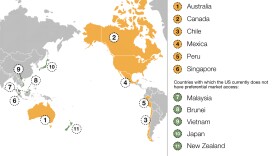By Alan Wade
http://stream.publicbroadcasting.net/production/mp3/wkms/local-wkms-962706.mp3
Murray, KY – Navigational rules make our lakes safer. U.S. Coast Guard Auxiliary member Alan Wade reflects on what boaters need to learn before hitting the lakes.
Just like driving a car, there are rules for navigating the waterways. We all know that when we are driving our cars in the U.S., we stay on the right, pass on the left, and come to a complete stop when we see a red light. We also know that the three simple rules that I've just given you are just a very small list of all the things you need to know and practice to stay safe on the highways. Likewise, there are many things a boater needs to know and practice to navigate and stay safe on the waterways.
Last year during a fishing tournament, a boater died on Lake Barkley because of a collision. A collision can be prevented if every boat operator fulfills the following three major responsibilities. First, you must practice good seamanship. It is your responsibility to take all necessary action to avoid a collision by taking into account the weather, boat traffic, and limits of other boats. Second, keep a proper lookout. Failing to keep a sharp lookout is the most common cause of collisions. And third, you should maintain a safe speed. Operating your boat at a safe speed ensures that you will have ample time to avoid a collision and can stop within an appropriate distance. Safe speed will vary depending on conditions such as wind, water conditions, navigational hazards, visibility, surrounding vessel traffic density, and the maneuverability of your vessel. You should always reduce speed and navigate with extreme caution at night and when visibility is restricted.
There are many other things that a safe boater needs to know. These include who has the right-of-way, how to operate in meeting situations or overtaking situations or crossing situations, how to signal your intentions, how to read the buoys and markers on or along the waterway, and many other things. If you want to know more about all of these things, you should take a boating course. There are many options available to you. As a member of the US Coast Guard Auxiliary, I would like to recommend a boating class offered by your local Coast Guard Auxiliary Flotilla. Experienced instructors can help you to understand what you need to know. When you take a safe-boating course sponsored by the Coast Guard Auxiliary, you might even reduce your boat insurance cost.
If you want to know more about a Coast Guard Auxiliary class, search online for US Coast Guard Auxiliary 4 Rivers, for a flotilla near you.
As always, avoid excessive speed, avoid alcohol, and always wear a life jacket! Stay safe on the water, and make this your best boating season ever.
By Alan Wade of the U.S Coast Guard Auxiliary, a volunteer branch working to contribute to the safety and security or our citizens, posts, waterways and coastal regions.





